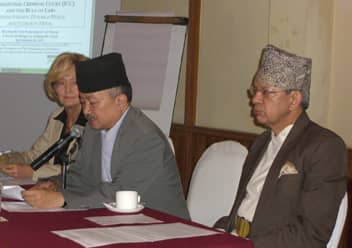
September 28, 2007 | Kathmandu, Nepal
Parliamentarians for Global Action (PGA) organised a Round-Table Discussion on the Accession and Implementation of the Rome Statute of the International Criminal Court (ICC) in Nepal, hosted by the Speaker of the Parliament of Nepal. The Round-Table was supported by the European Commission and the Governments of The Netherlands and Switzerland.
Representatives of the UN Office of the High Commissioner for Human Rights, Amnesty International and the CICC, as well as local and international NGOs and the academia attended this event, which saw the active participation of 16 MPs from all major political parties of Nepal.
At the end of the meeting, all participating MPs joined in a consensus in support of the prompt accession of Nepal to the Rome Statute of the ICC, an instrument that may be able to deter and prevent future crimes against humanity and war crimes and play a positive role for the stabilisation and transition to democracy and the Rule of Law after more than a decade of conflict.
PGA Members from Nepal from most political parties have been supportive of the ICC since 2002, when MPs Pashupati Rana and Chakra Prasad Bastola (both former Foreign Ministers) joined a PGA consultation on the ICC in South Asia held in Delhi, India. In July 2006, PGA Member Mr. Gurung, MP, submitted a pro-ICC resolution to Parliament, which adopted it unanimously.
The Round-Table Discussion was preceded by separate meetings of the PGA staff with Nepali high officials and a joint mission, organised by Amnesty International and the CICC, to brief Members of the Nepali Government and political parties on the importance of the ICC for a country in transition as Nepal is. PGA bilaterally met with the ex-Minister Mr. Govinda Raj Joshi (NCP) MP, and later with Mrs. Sujata Koirala (NCP) MP. Along with the CICC and Amnesty International, PGA delegation was received by the Maoist Spokesperson and former information and communication Minister, Mr. Krishna Bahadur Mahara. In a groundbreaking meeting with top officers from the Ministryfor Foreign Affairs of Nepal (see photo gallery), the Under-Secretary and the Joint Secretary for UN and Legal Affairs told PGA, AI and the CICC delegation that the Government had finalised a cabinet memo on ratification that had been submitted earlier in 2007 to the Office of the Prime Minister for Cabinet determination. Parliament will be triggered only after that Cabinet would have approved the memo.
The meetings and the Round-Table have been assessed as extremely useful by participating MPs, including members of the Maoist Party who joined Parliament after that the pro-ICC resolution had been adopted in July 2005. Observers noted that the meetings and the Round-Table promoted awareness and understanding of the Rome Statute of the ICC among all MPs and other stakeholders (see list of participants) that were not yet convinced that acceding to the Rome Statute would be in Nepal's national interest.



